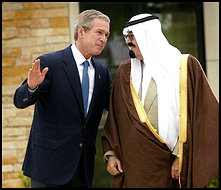The battle going on in the US right now between the liberal left and the religious right results in a lot of rhetoric but little analysis. Are we seeing a fundamental philosophical shift in the mindset of the country, or are we experiencing a sort of sheepish phenomenon in which neither side has any philosophy at all? Baaaaa…
The past couple of decades has seen a series of ideological movements, all of which built on or contradicted existing ones. The spirit of the
French Revolution aroused the idea that everyone can be anyone and that all men are created equal. From there we had the industrial revolution,
communist revolution, fascism, existentialism, and Islamism, among others. Freedom has, in essence, given man the opportunity to be free from God, who, according to Christian fundamentalists in this country, is an oppressive, brutal dictator Who will send you to
Hell for disobeying Him. Nevermind that Christ the philosopher rebel preached
peace and love and
forgiveness.
Back in the day, the church was an enforcer of intellect. Monasteries were centers of learning and progress. Today, the church in America seems to hinder intellect, as the religious right has no basis in rationality for some of its beliefs. There is no
meaning behind the silliness of calling
cartoon characters gay, for example. It’s almost as if this kind of fundamentalist Christianity in this country is more of an irrational paranoia, a kind of mental derangement rather than a belief system. I may have a
fear of crime when I am walking home from work, but it is based on rationality, for I see crackheads on a daily basis and I see news reports on shootings three blocks from my house.
Perhaps the most anti-Christian movement was the
existential movement. Camus made not-believing in god his religion. The anti-Christian rhetoric of the existentialists was not new, as
Nietzsche had also made anti-Christianity an intellectual movement as a sort of precursor to the existentialists. However, the aftermath of the existential movement sparked a religious revitalization that we are witnessing today in the Islamic Revolution.
What am I talking about, you ask? Well, it’s no secret that the father of modern jihad,
Sayed Qutb, was well versed in the Western existential movement. He was disgusted with materialism that he saw while living in the West, and he is search for meaning in life led him to a fiery version of Islam, a sort of anti-Christ in the realm of capitalism.
Read National Review’s article on Camus and 20th century clarity.


